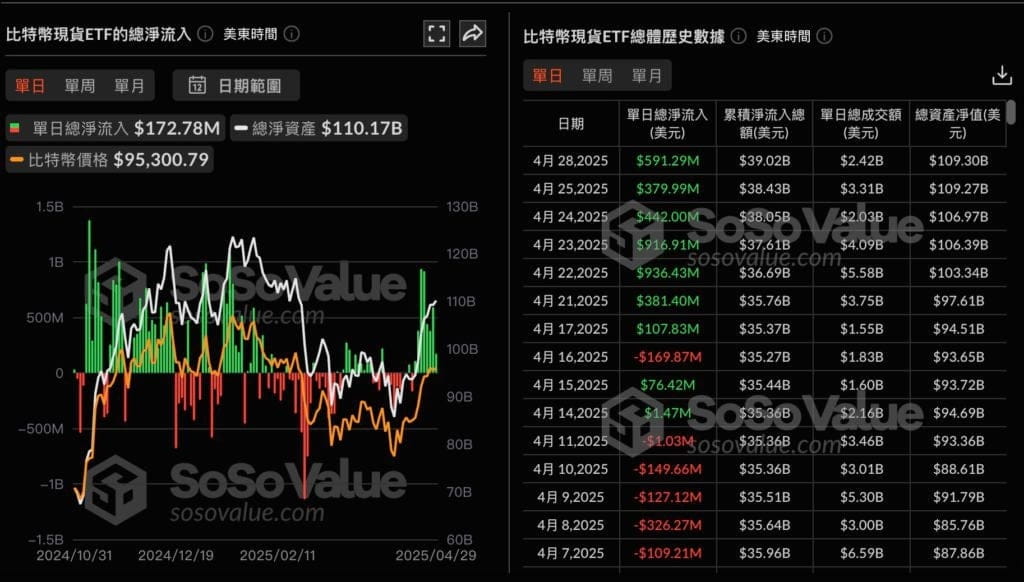BlackRock's iShares Bitcoin Trust (IBIT) ETF experienced a net inflow of $970 million on April 28, Eastern Time, setting the second-highest single-day record since its inception. This not only strongly demonstrates institutional investors' continued interest in Bitcoin (BTC) but also sparks heated discussions in the market about whether spot Bitcoin ETFs are becoming a key force driving price increases and providing 'structural support.'
Institutional Fund Frenzy: The Amazing Capital-Attracting Power of BlackRock's IBIT
According to Sosovalue data, the previous record for the highest single-day inflow occurred on November 7, 2024, amounting to $1.12 billion. This nearly $1 billion inflow pushed the total net inflow of all U.S. spot Bitcoin ETFs to about $590 million that day.
Faced with such strong capital momentum, Nate Geraci, president of ETF Store, commented on social media: 'Today, the iShares Bitcoin ETF saw inflows of nearly $1 billion... the second-largest inflow since its launch in January 2024. I remember when people said there was no demand.' This robustly refutes earlier claims regarding insufficient institutional interest in Bitcoin.
Currently, the U.S. spot Bitcoin ETF market has seen net inflows for eight consecutive days. Market analysts generally believe that this wave of institutional funds is one of the key factors behind Bitcoin's rapid rebound to $95,000. Nexo analyst Iliya Kalchev pointed out that last week’s net inflow of over $3 billion into ETFs provided the market with 'structural support that could drive further increases.'

Reshaping the Market Landscape: How Bitcoin ETFs Provide 'Structural Support'?
Generally speaking, the influx of institutional funds helps enhance market maturity and stability. Compared to the highly volatile retail speculation, institutional investors usually have a longer investment horizon and more robust trading strategies.
In terms of ETF market size, the IBIT, which has achieved significant inflows, is currently the largest spot Bitcoin ETF in the market, with assets under management (AUM) exceeding $56 billion, firmly maintaining its market leadership. According to Dune data, IBIT holds over 51% of the entire U.S. spot Bitcoin ETF market share, highlighting its significant advantage and market influence in attracting funds.
Furthermore, according to data from ETF Database, IBIT has ranked among the top 33 ETFs globally, its influence has already transcended the cryptocurrency field, penetrating the core of traditional financial markets.

New Developments at the Government Level
In addition to the influx of institutional funds brought by ETFs, there have been recent government-level developments supporting Bitcoin. The Arizona State Legislature in the United States passed a groundbreaking bill this Wednesday, allowing up to 10% of reserve funds to be used to purchase Bitcoin, integrating it into the state's reserve assets.
If this bill successfully receives the governor's signature, Arizona will become the first region in the United States to include Bitcoin in its official reserves. This not only recognizes Bitcoin as a store of value at the local government level but may also pave the way for similar legislation in other states and even at the federal level.
Market Outlook and Potential Risks
Market analysts generally expect that with continued stable inflows into ETFs, if Bitcoin prices can successfully consolidate above $94,000-$95,000, the next important psychological resistance level could be $100,000.
However, the risks from the Trump trade war still persist; can Bitcoin truly solidify its status as 'digital gold' and challenge higher price milestones? The market is closely monitoring this.


